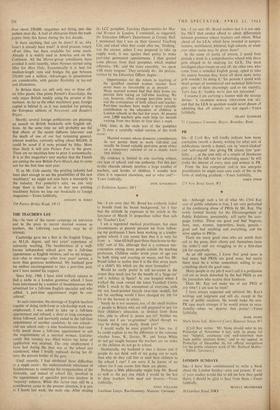SIR,—In view of the recent campaign on television and in
the press to recruit married women as teachers, the following .case-history may be of interest: Cambridge gave me a first in the English Tripos, an M.Litt. degree, and two years' experience of university teaching. The headmistress of a well- known independent school gave me a full-time appointment as English mistress, and on my resigna- tion—due to marriage—after four years' service, a more than generous testimonial. My husband gave me endless encouragement to take a part-time post, and I have needed his support.
Since July, 1960, I have tried without success to find a niche in a London grammar school. I have been interviewed by a number of headmistresses who advertised for a full-time English specialist and who added, 'a part-time appointment might be con- sidered.
At each interview, the shortage of English teachers capable of doing sixth-form or scholarship work was emphasised; I was asked to take up a full-time appointment and refused; a short or long correspon- dence followed, and inevitably ended in the full-time appointment of another candidate. In one school— and one school only—a wise headmistress had care- fully pared down a full-time appointment to suit the requirements of a married woman. Unfortu- nately this vacancy was filled before my letter of application was received. The only employment I have had during the 'ear was at the school just mentioned, when I briefly replaced, during her ill- ness, the present holder of the post.
Until recently, I had attributed these difficulties to a single cause: the understandable reluctance of headmistresses to undertake the reorganisation of the timetable, and indeed of school life, involved ' in the appointment of specialist part-time teachers in 'majority' subjects. While this factor may still be a contributory cause to the present situation, it is not, th; I learnt last week, the main one. After reading
the LCC pamphlet, Teaching Opportunities for Mar- ried Women in London, 1 contacted,, as suggested, the Education Officer's Department at County Hall. I mentioned that I was on their General Teaching List, and asked what they could offer me, 'Nothing,' was the answer, unless I was prepared to take up supply work; it was against their policy to make part-time permanent appointments. I then quoted some phrases from their pamphlet, which implied otherwise. 'Oh,' said the voice smoothly, 'we speak with many tongues.' They certainly do: the preface, written by the Education Officer, begins:
Opportunities for the return to teaching of the qualified married woman teacher have never• been so favourable as at present. . . . Many married women find that their home ties prevent their taking on full-time teaching. We can, however, often arrange part-time posts to suit the convenience of both school and teacher. Part-time teachers have made a most valuable contribution to the education of children in London schools in the last few years. At present over 2,000 teachers give such help for neriods varying from two hours to four days a week.
Only later, in the main text of the • pamphlet (p 7) does a carefully veiled version of -the truth occur: Married women whose domestic commitments do not permit them to work full-time can usually be found suitable part-time postS either on a temporary salaried or on a supply basis (my italics),
My evidence is limited to one teaching subject, one type of school, and one authority. Yet thirs par- ticular charade already involves a large number of teachers, and hordes of children. I wonder how often it is repeated elsewhere, and to what end?— Yours faithfully, Eccleston Square, SW1
ANNE KINDERSLEY














































 Previous page
Previous page